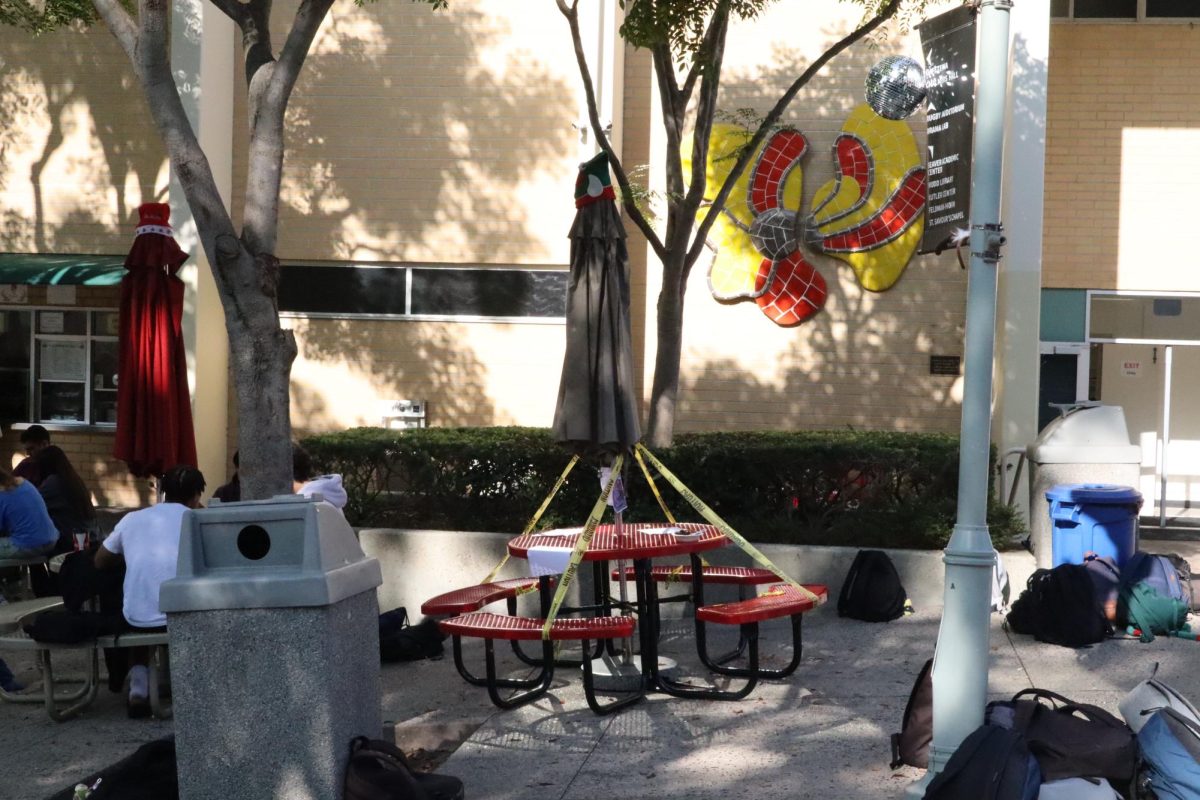Muffled sounds of music and flashing neon lights spill out of the front door of the house as Liam*, a host of many high school parties, stands with a list of names in one hand and collects cash with the other. A line of eager teens snakes down the block, each ready to pay their way into this Saturday’s party.
As the line moves forward, two girls whose names are not on the list offer up crisp $100 bills each in the hopes that he will let them past the gate and into the crowded backyard. Liam said kids who are not on the list will regularly pay above the typical entry price of $15-$20 due to the appeal of the parties and the lack of competitors.
“There is not really any competition [with other party hosts], so we end up having everybody coming to [our] parties,” Liam said. “Everybody does pay to get in. We have our set prices and whoever shows up that is not on the list has to pay a bit more because we didn’t account for them in capacity. If we aren’t making as much profit, we bump up the prices by $10 and make close to an extra $1,000.”
Griffin*, another one of the hosts, said each party typically brings in enough profit to both invest in future parties and provide personal income.
“We usually make about $6,000 total per party,” Griffin said. “We are always making more money than the last time which allows each of the party hosts to pocket a good amount too.”
High school party planning consists of finding a venue, hiring DJs, buying decor and, the largest expense, supplying alcohol. Liam said he and the other hosts are willing to spend large amounts of money on each of these aspects, as long as they still make a profit by the end of the night.
“It takes a lot of money for each party,” Liam said. “The tent that we rent is about $1,000 every time and security is [usually] $220 a night for three guys. We pay the DJs $500 and they decide how to split that among themselves. We also pay somebody over the age of 21 about $1,200 to get us the alcohol. All of our expenses will probably come out to $2,900 each party.”
Reggie*, a third host working with the same group, said they now have adults from event insurance companies working behind the scenes to advise them on matters that require adult oversight, like liability or alcohol.
Adults who host or permit underage drinking in their homes or other properties in their control are subject to fines and are liable for any injuries which occur as a product of the drinking, under the California Social Host Liability law.This year, for the first time, the hosts said they secured event insurance that protects them from liability for any incidents that may occur at the parties. With this insurance in place, Reggie and the other hosts said they are relieved to no longer be personally responsible for any issues that may arise. Despite the risks, Liam said hosting parties comes with a lot of benefits as well.
“There are two reasons why you would want to run [the parties],” Liam said.“The first is honestly to throw good parties for the seniors, since it’s our last year. The second part is obviously the money, because we are in this for the business side of it too. As long as we are making money every time, we are willing to throw two to three times a month.”
Liam said parties thrown by students at the school tend to be more expensive and extravagant than parties thrown by kids at other schools.
“We really care about throwing good parties,” Liam said. “We all work our a**es off in school during the week. When Saturday comes around, all anyone wants to do is [have fun] with each other. It’s work hard, play hard. We don’t have that luxury of [having fun] during the week.”
High school parties can be exclusive and have limited capacity. 38% of teens reported they do not attend any parties in a normal month, according to a study done by CBS. Liam and other hosts said the entry list is made through the social media platform, Facebook. Hosts create an event on the app and invite kids through their profiles. Invitations through the app ensure that only hosts can select who is allowed entry. Ryan Hung ’26 said the exclusivity in attending parties can lead to tension between friends.
“I think that the parties can be exclusive,” Hung said. “My friends and I don’t have trouble going to them, but the Facebook lists gives it a sense of exclusivity. It can be awkward if some people you know can’t go because everyone tries to get in. Sometimes, I have multiple people texting me to get in even though I don’t run the parties.”
Griffin said the demand to get into these parties can become so intense that some people attempt to sneak past security.
“People can get pretty rowdy when we don’t let them in,” Griffin said. “At one house, we had ten kids rip open the neighbor’s fence to get into the party because security wasn’t letting them in. People try to create their own ways of getting in all the time.”
Though people can go to great lengths to get into parties, these events can also offer positive experiences for attendees. Throwing or attending parties, no matter the size, can have lasting benefits for mental health, according to the BBC. Kai Kuklinski ’26 said he attends parties because they give him an opportunity to meet new people and unwind with friends.
“For a lot of people, having these parties is a really good thing,” Kuklinski said. “It allows you to spend time with friends and also meet other people you wouldn’t talk to usually. Other than parties, you’re never going to really get a large group of people to all hang out together like that.”
Gwen*, a student at the school, said she sometimes finds her schoolwork leaves her too overwhelmed to attend parties regularly.
“I feel pretty neutral about having parties on the weekends,” Gwen said. “It personally stresses me out to have a party every weekend. I’m too stressed about school on a regular basis to be going to a party every weekend.”
Griffin said that he enjoys putting together parties because of the fun atmosphere they create for everyone attending.
“At the end of the day, we get to have a great time together,” Griffin said. “We get to bring peple toogether and we get to see everyone having fun and that all brings us joy.”
Liam said that despite the administration’s awareness of the parties, there are no serious risks if they remain separate from the school.
“The school for sure knows about the parties,” Liam said. “[But], as long as we don’t affiliate with Harvard-Westlake, or our photos aren’t on the Facebook, then it should be fine. With parents, I think they know that their kids are going to be partying and getting drunk. Nowadays it’s just kind of the culture.”
Head of Upper School Beth Slattery said the school is aware of which students put together the parties and informs them of potential dangers at the beginning of every year.
“We typically know who the people organizing the parties [are], and it’s not, in and of itself, a violation of school rules to organize,”Slattery said. “Last year, I happened to have a good relationship with a number of the kids who were planning things and I would have conversations with them and just make sure that they understood [the risks].”
Liam said the party host position gets passed down to seniors from year to year and is determined by multiple factors.
“Last year, we kind of already knew we wanted to do it,” Liam said.“There were other people that wanted to do it, but it’s kind of just based off who has the funds, the equipment and whoever has the most amount of people wanting to go to their party.”
Slattery said that students planning the party should recognize the potential long-term effects on their mental health if any serious incidents occur during the event.
“One of the things I remember saying last year to one of the students who was involved in the planning is, if somebodywere to be injured or killed on your watch, you’ll never get over that,” Slattery said. “It will change your life and you need to understand that stuff can go awry. Worry less about the legal ramifications. The moral obligation that you have is significant.”





























